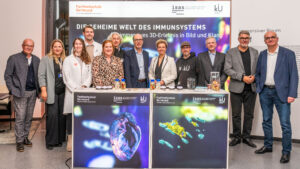SCIENCE MASTERPLAN
Universities
außeruniversitäre Forschungsinstitute
Studierende
Kultureinrichtungen
MASTERPLAN
WISSENSCHAFT
Universities
außeruniversitäre Forschungsinstitute
Studierende
Kultureinrichtungen
News
20.01.2026 | 20 Jahre "Bild und Klang": Öffentliche Vorlesung beleuchtet 250 Jahre USA
18.11.2025 | Ein Vortrag aus der Reihe "Lust auf Wissenschaft"
Der Erfolg der Abnehmspritze ist spektakulär – sie wirkt im Gehirn und steuert so unseren Appetit. Beginnt Übergewicht also letztlich im Gehirn? Und welche Rolle spielt das Gehirn eigentlich bei Stoffwechselerkrankungen wie Diabetes und Adipositas?
Auf diese spannenden Fragen wird Prof. Dr. Jens Brüning, Direktor am MPI für Stoffwechselforschung und Direktor der Poliklinik für Endokrinologie, Diabetologie und Präventivmedizin der Uniklinik Köln, in seinem Vortrag eingehen.
Prof. Brüning bildete mit seiner wegweisenden Forschung die Grundlage dafür, die Schlüsselfunktion des Gehirns bei der Stoffwechselregulation zu identifizieren und seine Kontrolle von Blutzucker, Appetit und Körpergewicht aufzudecken. Damit ermöglicht seine Arbeit die Entwicklung neuer Präventions- und Therapieansätze bei Stoffwechselkrankheiten.
Jens Brüning ist ein gefragter Experte für Themen wie Übergewicht, Diabetes und die Abnehmspritze und wird häufig im Fernsehen sowie in Zeitungen interviewt. Er gehört weltweit zu den führenden WissenschaftlerInnen in den Bereichen Endokrinologie und Stoffwechselforschung.
Die Vortragsreihe „Lust auf Wissenschaft“ richtet sich an alle, die sich aus erster Hand und in allgemein verständlicher Form über neue Entwicklungen in der Forschung informieren möchten.
Eine Anmeldung ist nicht erforderlich.
Newsletter Masterplan Wissenschaft
👉 Jetzt abonnieren: Am Ende der Startseite können Sie sich für den Newsletter anmelden.

Vorschau: Newsletter Wissenschaft 2024: Rückblick und Ausblick
+++++Innovationsraum PROJEKTOR nach Umzug wieder geöffnet+++++
Nach einer umfassenden Umzugs- und Renovierungsphase ist es endlich so weit: Der Innovationsraum PROJEKTOR hat neu eröffnet.
Following an extensive relocation and renovation phase, the time has finally come: the PROJEKTOR innovation space has reopened.
The PROJEKTOR at Kleppingstraße 28 is now available for bookings again.
Alle wichtigen Informationen zum PROJEKTOR sowie die Möglichkeit zur Buchung gibt es here
Recap science Night 2024!
Studieren in Dortmund
Wissenschaftsstadt Dortmund – Lerne uns kennen
ICAPITAL - INTERNATIONALE GÄSTE VERNETZEN SICH BEI WORKSHOPS IN DER INNOVATIONSHAUPTSTADT DORTMUND
ICAPITAL AWARD: Neues Wandbild verschönert die Dortmunder Innenstadt
Dortmunds Innenstadt ist um ein Wandbild, ein sogenanntes Mural, reicher. Der Künstler Juri Schäffer greift damit Dortmunds Innovationsansatz „Zukunft aus der Nachbarschaft“ und Ideen der europäischen Zusammenarbeit auf.
Weitere Infos unter: dortmund.de
"Innovation next door" | Bewerbungsvideo zur europäischen Innovationshauptstadt 2021 (icapital)
Wissenschaftstag (Virtuelle Einblicke)
Partners
Statements
Partners
Statements
Contact
City of Dortmund
Department for Mayoral and City Council’s Affairs
Science Master Plan Coordination Office
Südwall 21-23
44137 Dortmund, Germany
wissenschaft@stadtdo.de
dortmund.de
Angela Märtin,
Science and Academia Officer
0231 50-22586
amaertin@stadtdo.de
Dr. Sandra Danneil,
Research Assistant
0231 50-25809
sdanneil@stadtdo.de
Contact
City of Dortmund
Amt für Angelegenheiten des Oberbürgermeisters und des Rates Hochschule & Wissenschaft
Science Master Plan Coordination Office
Südwall 21-23
44137 Dortmund, Germany
Science and Academia Officer
0231 50-22586
amaertin@stadtdo.de
Christina-Bella Pagés,
Research Assistant
0231 50-25945
lberndt@stadtdo.de
Newsletter
Many thanks to Sparkasse Dortmund for supporting the creation of this website.
Photo: City of Dortmund/Roland Gorecki
Contact
City of Dortmund
Amt für Angelegenheiten des Oberbürgermeisters und des Rates Hochschule & Wissenschaft
Science Master Plan Coordination Office
Science and Academia Officer
0231 50-22586
amaertin@stadtdo.de
Christina-Bella Pagés,
Research Assistant
0231 50-25809
cpages@stadtdo.de
Contact
City of Dortmund
Amt für Angelegenheiten des Oberbürgermeisters und des Rates Hochschule & Wissenschaft
Science Master Plan Coordination Office
Science and Academia Officer
0231 50-22586
amaertin@stadtdo.de
Christina-Bella Pagés,
Research Assistant
0231 50-25809
cpages@stadtdo.de
Newsletter
Many thanks to Sparkasse Dortmund for supporting the creation of this website.





























